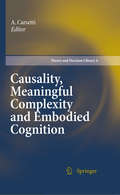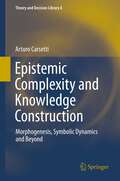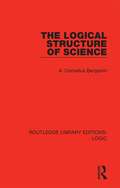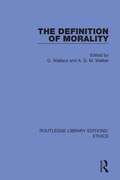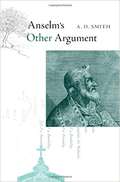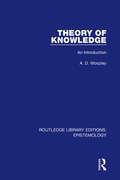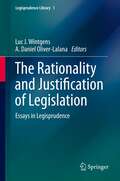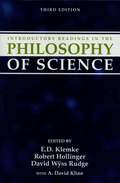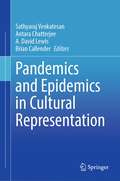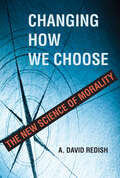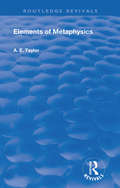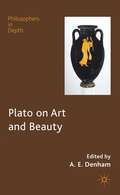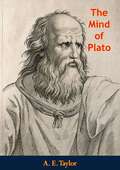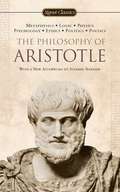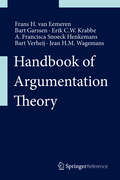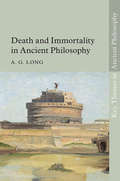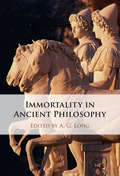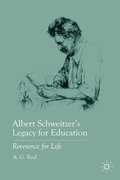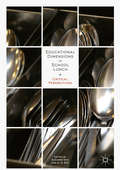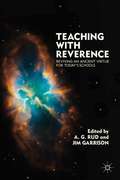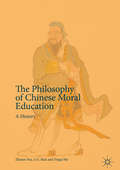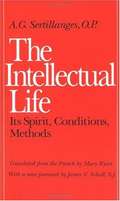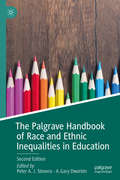- Table View
- List View
Causality, Meaningful Complexity and Embodied Cognition (Theory and Decision Library A: #46)
by A. CarsettiWith respect to the possible outlining of new models of the process of knowledge construction, we are really faced, at the moment, with the appearance of a new frontier: a frontier that appears strictly linked to the emergence of a conceptual revolution at the level of the analysis of that peculiar entanglement of complexity, information, causality, meaning, emergence, teleology and intentionality that characterizes the unfolding of the "natural forms" of human cognition. To recognize some of the peculiar knots of this particular conceptual revolution precisely constitutes the first target of the volume. Cognitive activity is rooted in Reality, but at the same time represents the necessary means whereby Reality can embody itself in an objective way: i.e., in accordance with an in-depth nesting process and a surface unfolding of operational meaning. In this sense, the objectivity of Reality is also proportionate to the autonomy reached by cognitive processes. Within this conceptual framework, reference procedures thus appear as related to the modalities providing the successful constitution of the channel, of the actual link, in particular, established at the neural level between operations of vision and thought. Such procedures ensure not a simple "regimentation" or an adequate replica, but, on the contrary, the real constitution of a cognitive autonomy in accordance with the truth. A method thus emerges which is simultaneously project, telos and regulating activity: a code that becomes process, positing itself as the foundation of a constantly renewed synthesis between function and meaning. In this sense, at the level of cultural evolution, reference procedures act as guide, mirror and canalisation with respect to primary information flows and involved selective forces. They also constitute a precise support for the operations which "imprison" meaning and "inscribe" the "file" considered as an autonomous categorial (and generating) system. In this way, they offer themselves as the actual instruments for the constant renewal of the code, for the invention and the actual articulation of an ever-new incompressibility.
Epistemic Complexity and Knowledge Construction
by A. CarsettiThe volume as its first target aims at clarifying that peculiar entanglement of complexity, causality, meaning, emergence and intentionality that characterises the unfolding of the "natural forms" of human cognition As is well known, cognition is not only a self-organising process. It is also a co-operative and coupled process. If we consider the external environment as a complex, multiple and stratified Source which interacts with the nervous system, we can easily realise that the cognitive activities devoted to the "intelligent" search for the depth information living in the Source, may determine the very change of the complexity conditions according to which the Source progressively expresses its "wild" action. In this sense, simulation models are not neutral or purely speculative: the true cognition actually appears to be necessarily connected with successful forms of reading, those forms, in particular, that permit a specific coherent unfolding of the deep information content of the Source. Therefore, the simulation models, if valid, materialise as "creative" channels, i.e., as autonomous functional systems, as the very roots of a new possible development of the entire system represented by mind and its Reality. From a general point of view, the objectivity of Reality is also proportionate to the autonomy reached by cognitive processes. In this sense, at the level of cultural evolution, reference procedures act as guide, mirror and canalisation with respect to primary information flows and involved selective forces: they offer themselves as the actual instruments for the constant renewal of the code, for the invention and the actual articulation of an ever-new incompressibility. From an effective point of view, they appear as indissolubly linked to the successive definition of specific (and innovative) measures of the epistemic complexity. These measures cannot concern only statistical rarity (Shannon) or computational incompressibility (Kolmogorov-Chaitin), on the contrary they should also be able to take into account the coupled connection between the Source and the cognitive agent, the evolution of this connection as well as the successive constitution of meaning as symbolic form. Hence the possible (and necessary) definition of new axiomatic systems, new measure spaces, the real displaying of processes of continuous reorganisation at the semantic level. Indeed, it is only through a complete, first-order "reduction" and a correlated non-standard second-order analysis that new incompressibility will actually manifest itself. Therefore, the reference procedures appear to be related to a process of multiplication of minds, as well as to a process of "clarification" of meanings which finally emerges as vision via principles.
The Logical Structure of Science (Routledge Library Editions: Logic)
by A. Cornelius BenjaminThis book addresses the argument in the history of the philosophy of science between the positivists and the anti-positivists. The author starts from a point of firm conviction that all science and philosophy must start with the given… But that the range of the given is not definite. He begins with an examination of science from the outside and then the inside, explaining his position on metaphysics and attempts to formulate the character of operational acts before a general theory of symbolism is explored. The last five chapters constitute a treatise to show that the development from one stage of symbolismto the next is inevitable, consequently that explanatory science represents the culmination of knowledge.
Socrates on Trial
by A. D. IrvineMore than 2,400 years after his death, Socrates remains an iconic but controversial figure. To his followers, he personified progressive Greek ideals of justice and wisdom. To his detractors, he was a corruptor of the young during wartime and one of the reasons Athens had suffered a humiliating defeat to Sparta in 404 BC. Socrates' story is one of historic proportions and his unyielding pursuit of truth remains controversial and relevant to the present day.Socrates on Trial presents the story of Socrates as told to us by Aristophanes, Plato, Xenophon, and others. The play uses fresh language to emphasize what is important in the works of these ancient authors, while at the same time remaining faithful to the general tenor and tone of their writings. Andrew Irvine has created a script that not only fits comfortably into the space of a single theatrical performance, but is also informative and entertaining. Suited for informal dramatic readings as well as regular theatrical performances, Socrates on Trial will undoubtedly appeal to instructors and students, and its informative introduction enhances its value as a resource.Complete with production and classroom notes, this modern recasting of the Socrates story will make riveting reading both inside and outside the classroom.
The Definition of Morality
by G. Wallace A. D. M. WalkerOriginally published in 1970, the papers in this volume discuss the essential and defining characteristics of morality and moral issues and examine how moral views differ from political views, moral beliefs from religious beliefs, and moral judgements from aesthetic judgements. Some of the chapters discuss problems of method and shed light on the complex conditions which any successful definition of morality must satisfy. Taken collectively, these papers reflect he wide variety of approaches adopted by contemporary philosophers.
Anselm's Other Argument
by A. D. SmithAnselm of Canterbury (1033-1109 CE), in his work Proslogion, originated the "ontological argument" for God's existence, famously arguing that "something than which nothing greater can be conceived," which he identifies with God, must actually exist, for otherwise something greater could indeed be conceived. Some commentators have claimed that although Anselm may not have been conscious of the fact, the Proslogion as well as his Reply to Gaunilo contains passages that constitute a second independent proof: a "modal ontological argument" that concerns the supposed logical necessity of God's existence. Other commentators disagree, countering that the alleged second argument does not stand on its own but presupposes the conclusion of the first. Anselm's Other Argument stakes an original claim in this debate, and takes it further. There is a second a priori argument in Anselm (specifically in the Reply), A. D. Smith contends, but it is not the modal argument past scholars have identified. This second argument surfaces in a number of forms, though always turning on certain deep, interrelated metaphysical issues. It is this form of argument that in fact underlies several of the passages which have been misconstrued as statements of the modal argument. In a book that combines historical research with rigorous philosophical analysis, Smith discusses this argument in detail, finally defending a modification of it that is implicit in Anselm. This "other argument" bears a striking resemblance to one that Duns Scotus would later employ.
Theory of Knowledge: An Introduction (Routledge Library Editions: Epistemology Ser.)
by A. D. WoozleyOriginally published in 1949. Understanding the questions is the major problem when beginning philosophy. This book does not attempt to provide the answers, but defines the questions and shows by example how they should be tackled. Subjects treated include the nature of the objects of thought and judgment; truth and error in belief; perception and knowledge of the material world; the status and function of memory.
The Rationality and Justification of Legislation: Essays in Legisprudence
by Luc J. Wintgens A. Daniel Oliver-LalanaThe essays collected in this book address legislation from the viewpoint of legal theory and provide an overview of current research in legisprudence as a new scholarly approach to lawmaking. The overall focus of the volume is on the justification of legislation, with a special emphasis on the intricate notion of legislative rationality. With the rational justification of legislation as their central theme, the essays elaborate on the foundations and bounds of legislation and the search for a more principled lawmaking, discuss the role of legislation within the framework of democratic constitutionalism, analyze legislation as implementation of constitutional law, and explore how legislative argumentation in parliament can be construed as a source of justification of laws.
Introductory Readings in the Philosophy of Science
by E. D. Klemke Robert Hollinger David W. Rudge A. David KlineFor nearly two decades, "Introductory Readings in the Philosophy of Science" has distinguished itself as the standard for texts specifically designed to meet the needs of beginning students. Retaining the best essays from the first two editions, the editors have added ten important new selections to maintain this influential text's relevance for today and tomorrow. Readings cover such timely and important topics as feminism and the sciences, the effects of science on society, the natural versus the social sciences, and science and human values.
Pandemics and Epidemics in Cultural Representation
by A. David Lewis Sathyaraj Venkatesan Antara Chatterjee Brian CallenderThis edited book analyses how artists, authors, and cultural practitioners have responded to and represented episodes of epidemics/pandemics through history. Covering a broad range of notable epidemics/pandemics (black death, cholera, Influenza, AIDS, Ebola, COVID-19), the chapters examine the cultural representations of epidemics and pandemics in different contexts, periods, languages, media, and genres. Interdisciplinary in nature and drawing on perspectives from medicine, literature, medical anthropology, philosophy of medicine, and cultural theory, the book investigates and emphasizes the urgent need to reflect on past catastrophes caused by such outbreaks. By delving into cultural history, it re-examines how societies and communities have responded in the past to species-threatening epidemics/pandemics. Sure to be of interest to lay readers as well as students and researchers, this work situates epidemics and pandemics outbreaks within the contexts of culture and narrative, and their complex and layered representation, commenting on intersections of contagion, culture, and community. It offers a cross-cultural, global, and comparative analysis of the trajectories, histories and responses to various epidemics/pandemics that impacted people worldwide.
Changing How We Choose: The New Science of Morality
by A. David RedishThe &“new science of morality&” that will change how we see each other, how we build our communities, and how we live our lives.In Changing How We Choose, David Redish makes a bold claim: Science has &“cracked&” the problem of morality. Redish argues that moral questions have a scientific basis and that morality is best viewed as a technology—a set of social and institutional forces that create communities and drive cooperation. This means that some moral structures really are better than others and that the moral technologies we use have real consequences on whether we make our societies better or worse places for the people living within them. Drawing on this new scientific definition of morality and real-world applications, Changing How We Choose is an engaging read with major implications for how we see each other, how we build our communities, and how we live our lives.Many people think of human interactions in terms of conflicts between individual freedom and group cooperation, where it is better for the group if everyone cooperates but better for the individual to cheat. Redish shows that moral codes are technologies that change the game so that cooperating is good for the community and for the individual. Redish, an authority on neuroeconomics and decision-making, points out that the key to moral codes is how they interact with the human decision-making process. Drawing on new insights from behavioral economics, sociology, and neuroscience, he shows that there really is a &“new science of morality&” and that this new science has implications—not only for how we understand ourselves but also for how we should construct those new moral technologies.
Elements of Metaphysics (Routledge Revivals)
by A. E TaylorFirst published in 1903, Taylor endeavours to provide a detailed study of metaphysic as a discipline. Opening with a brief history of metaphysics, the book explores topics including the problem of the metaphysician, the metaphysical method, subdivisions of metaphysics, ontology, reality, cosmology, rational psychology, morality, ethics and religion.
Plato on Art and Beauty
by A. E. DenhamThis unique collection of essays focuses on various aspects of Plato's Philosophy of Art, not only in The Republic , but in the Phaedrus, Symposium, Laws and related dialogues. The range of issues addressed includes the contest between philosophy and poetry, the moral status of music, the love of beauty, censorship, motivated emotions.
The Mind of Plato
by A. E. TaylorThrough his own writings and inspiration of Aristotle and countless others, Plato continues to influence every area of philosophic thought, to say nothing of his enormous influence on Christian theology. His dramatic dialogues, including Republic, the monumental treatise on the ideal state, render him one of the greatest of Greek literary geniuses.In this concise analysis, eminent Plato scholar A. E. Taylor examines the philosopher's theory of knowledge and doctrine of ideas; the ideal of the philosopher-king; the social system advocated in Republic; judgments on democracy; and belief in the immortality of the soul. Also considered: Plato's relationship with his master, Socrates; contribution to the idea of university education; attack on art; abstention from public life; anticipation of Copernicus. Taylor also mentions historical misunderstandings of the one he deems the most original and influential of all philosophers.-Print ed.“A. E. Taylor’s THE MIND OF PLATO is the work of a scholar of great eminence and the best brief introduction to Plato that I know.”—JOHN WILD“This short work, by one of the great Platonic authorities, presents the career and thought of Plato without the dogmatic, technical, or sentimental clichés found in many expositions of Platonism.”-RICHARD McKEON
The Philosophy of Aristotle
by Aristotle J. L. Creed A. E. Wardman Renford Bambrough Susanne BobzienMore than two thousand years ago, Aristotle established unique standards of philosophic inquiry, observation, and judgment. This book offers a contemporary reevaluation of the philosophy of the master of Western thought, and shows his vital, continuing influence in our modern world.
Handbook of Argumentation Theory
by Frans H. van Eemeren Bart Garssen Erik C. W. Krabbe A. Francisca Snoeck Henkemans Bart Verheij Jean H. M. WagemansThe Handbook Argumentation Theory provides an up to date survey of the various theoretical contributions to the development of argumentation theory for all scholars interested in argumentation, informal logic and rhetoric. It describes the historical roots of modern argumentation theory that are still an important theoretical background to contemporary approaches. Because of the complexity, diversity and rate of developments in argumentation theory, there is a real need for an overview of the state of the art, the main approaches that can be distinguished and the distinctive features of these approaches. The Handbook covers classical and modern backgrounds to the study of argumentation, the New Rhetoric developed by Perelman and Olbrechts-Tyteca, the Toulmin model, formal approaches, informal logic, communication and rhetoric, pragmatic approaches, linguistic approaches and pragma-dialectics. The Handbook is co-authored by Frans H. van Eemeren, Bart Garssen, Erik C. W. Krabbe, A. Francisca Snoeck Henkemans, Bart Verheij and Jean Wagemans, who are a coherent and prominent writing team whose expertise covers the whole field. The authors are assisted by an international Editorial Board consisting of outstanding argumentation scholars whose fields of interest are represented in the volume. "
Death and Immortality in Ancient Philosophy (Key Themes in Ancient Philosophy)
by A. G. LongDeath and immortality played a central role in Greek and Roman thought, from Homer and early Greek philosophy to Marcus Aurelius. In this book A. G. Long explains the significance of death and immortality in ancient ethics, particularly Plato's dialogues, Stoicism and Epicureanism; he also shows how philosophical cosmology and theology caused immortality to be re-imagined. Ancient arguments and theories are related both to the original literary and theological contexts and to contemporary debates on the philosophy of death. The book will be of major interest to scholars and students working on Greek and Roman philosophy, and to those wishing to explore ancient precursors of contemporary debates about death and its outcomes.
Immortality in Ancient Philosophy (Key Themes In Ancient Philosophy Ser.)
by A. G. LongImmortality was central to ancient philosophical reflections on the soul, happiness, value and divinity. Conceptions of immortality flowed into philosophical ethics and theology, and modern reconstructions of ancient thought in these areas sometimes turn on the interpretation of immortality. This volume brings together original research on immortality from early Greek philosophy, such as the Pythagoreans and Empedocles, to Augustine. The contributors consider not only arguments concerning the soul's immortality, but also the diverse and often subtle accounts of what immortality is, both in Plato and in less familiar philosophers, such as the early Stoics and Philo of Alexandria. The book will be of interest to all those interested in immortality and divinity in ancient philosophy, particularly scholars and advanced students.
Plato and the Stoics
by A. G. LongPlato was central both to the genesis of Stoic theory and to subsequent debates within the Stoa. These essays provide new and detailed explorations of the complex relationship between Plato and the Greek and Roman Stoic traditions, and together they show the directness and independence with which Stoics examined Plato's writing. What were the philosophical incentives to consulting and then returning to Plato's dialogues? To what extent did Plato, rather than Xenophon or Antisthenes, control Stoic reconstructions of Socrates' ethics? What explains the particular focus of Stoic polemic against Plato, and how strong is the evidence for a later reconciliation between Plato and Stoicism? This book will be important for all scholars and advanced students interested in the relationship between a major philosopher and one of the most important philosophical movements.
Albert Schweitzer’s Legacy for Education
by A. G. RudThis is the first book devoted to the study of the thought of Albert Schweitzer as it relates to educational theory and practice. Rud argues that Schweitzer's life and work offer inspiration and timely insights for both educational thought and practice in our new century.
Educational Dimensions of School Lunch: Critical Perspectives
by A. G. Rud Suzanne RiceSchool lunch is often regarded as a necessary but inconvenient distraction from the real work of education. Lunch, in this view, is about providing students the nourishment they need in order to attend to academic content and the tests that assess whether content has been learned. In contrast, the central purpose of this collection is to examine school lunch as an educational phenomenon in its own right. Contributing authors—drawing from a variety of disciplinary traditions, including philosophy, sociology, and anthropology—examine school lunch policies and practices, social and cultural aspects of food and eating, and the relation among school food, the environment, and human and non-human animal well-being. The volume also addresses how school lunch might be more widely conceptualized and practiced as an educational undertaking.
Teaching with Reverence
by Jim Garrison A. G. RudReverence is a forgotten virtue in teaching and learning. When taken in a broader spiritual sense, it is often associated with a mute and prim solemnity. The essays gathered here examine reverence as a way to understand some of the spiritual dimensions of classroom teaching.
The Philosophy of Chinese Moral Education: A History
by A. G. Rud Zhuran You Yingzi HuThe book depicts a unique historical and cultural phenomenon, the philosophy of Chinese moral education, in an attempt to capture the essence of Chinese culture. While tracing the historical journey of this philosophy, the book rearranges and interprets the conceptual frameworks concerning moral education in various Chinese philosophical schools and religions. In so doing, it summarizes the ideas of human relations, man and nature, cosmology, moral virtues, and educational approaches, posing intriguing questions about how they have influenced Chinese characteristics, social norms, and value orientations. In particular, the book brings up discussions on the culture of family and state, the challenges that the philosophy had encountered in early modern and present China, as well as the prospect of regeneration of the philosophy and its significance for our world today. This is the book to read if you want to have a deep understanding about China and its belief and educational system.
The Intellectual Life: Its Spirit, Conditions, Methods
by A. G. Sertillanges Mary RyanThis is above all a practical book. It discusses with a wealth of illustration and insight such subjects as the organization of the intellectual worker's time, materials, and his life; the integration of knowledge and the relation of one's specialty to general knowledge; the choice and use of reading; the discipline of memory; the taking of notes, their classification and use; and the preparation and organization of the final production.
The Palgrave Handbook of Race and Ethnic Inequalities in Education
by Peter A. J. Stevens A. Gary DworkinThis authoritative, state-of-the-art reference work builds on its first edition to provide a cutting-edge systematic review of the relationship between race/ethnicity and educational inequality. Studying 25 different national contexts drawn from every inhabited continent on earth and building upon material from the earlier edition, the work analyses educational policies, practices and research on minority students, immigrants and refugees. The editors and contributors explore principal research traditions from countries as diverse as Argentina, China, Norway and South Africa, examining the factors promoting social cohesion as well as considerations regarding the use of international test score data. Seamlessly integrating findings of national reviews, the editors and contributors analyse how national contexts of race/ethnic relations shape the character and content of educational inequalities, and deftly map out new directions for future research in the area.Global in its perspective and definitive in content, this one-stop volume will be an indispensable reference resource for a wide range of academics, students and researchers in the fields of education, sociology, race and ethnicity studies and social policy.Chapter 20 of this book is available open access under a CC BY 4.0 license at link.springer.com
